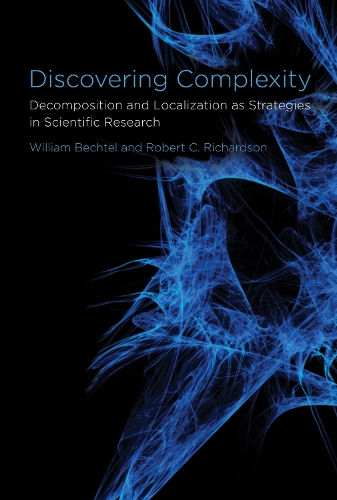
Discovering Complexity: Decomposition and Localization as Strategies in Scientific Research
(Paperback)
Publishing Details
Discovering Complexity: Decomposition and Localization as Strategies in Scientific Research
By (Author) William Bechtel
By (author) Robert C. Richardson
MIT Press Ltd
MIT Press
6th August 2010
6th August 2010
United States
Classifications
Professional and Scholarly
Non Fiction
Scientific research
Impact of science and technology on society
507.2
Physical Properties
Paperback
340
Width 152mm, Height 229mm, Spine 19mm
476g
Description
An analysis of two heuristic strategies for the development of mechanistic models, illustrated with historical examples from the life sciences.In Discovering Complexity, William Bechtel and Robert Richardson examine two heuristics that guided the development of mechanistic models in the life sciences- decomposition and localization. Drawing on historical cases from disciplines including cell biology, cognitive neuroscience, and genetics, they identify a number of "choice points" that life scientists confront in developing mechanistic explanations and show how different choices result in divergent explanatory models. Describing decomposition as the attempt to differentiate functional and structural components of a system and localization as the assignment of responsibility for specific functions to specific structures, Bechtel and Richardson examine the usefulness of these heuristics as well as their fallibility-the sometimes false assumption underlying them that nature is significantly decomposable and hierarchically organized. When Discovering Complexity was originally published in 1993, few philosophers of science perceived the centrality of seeking mechanisms to explain phenomena in biology, relying instead on the model of nomological explanation advanced by the logical positivists (a model Bechtel and Richardson found to be utterly inapplicable to the examples from the life sciences in their study). Since then, mechanism and mechanistic explanation have become widely discussed. In a substantive new introduction to this MIT Press edition of their book, Bechtel and Richardson examine both philosophical and scientific developments in research on mechanistic models since 1993.
Reviews
"In Discovering Complexity, Bechtel and Richardson sketched a blueprint for a post-reductive philosophy of science grounded in historical examples and focused on major heuristics and biases in the search for mechanisms. Many of the ideas in this book are as fresh today as they were when the book was first published; others have become the widely accepted background in the new mechanistic philosophy of science." Carl F. Craver, Washington University in St. Louis, author of Explaining the Brain "The first edition of Discovering Complexity pioneered what has come to be called 'the new mechanistic philosophy,' with original analyses of mechanistic explanation and the heuristics for discovering mechanisms in genetics, cell biology, and neuroscience. Having it back in print is a real service to philosophers and scientists investigating biological mechanisms, as well as critics of this approach. The new introduction is well worth reading on its own for an overview of the book's arguments, as well as summaries of the authors' more recent work on dynamic mechanistic explanations, discovery heuristics, emergence in systems biology, and circadian rhythms." Lindley Darden, University of Maryland, College Park "The original edition of Discovering Complexity was a landmark in the philosophy of science, with path-breaking accounts of explanation, mechanism, and the development of biological knowledge. This reissue is highly welcome, especially with the excellent new introduction that contains insightful updates about mechanisms, discovery, localization, emergence, and other crucial aspects of science." Paul Thagard, University of Waterloo, author of The Brain and the Meaning of Life "This classic of mechanistic analysis and explanation has been out of print for some years. It is reissued with a substantive new review of the explosion of interest in mechanistic explanation in philosophy of science and the crucial interpenetration of scientific and philosophical interests it represents. I welcome its return in even better form. MIT has done the profession a major service by reissuing this book. It should be required reading in any philosophy of science curriculum." William C. Wimsatt, Peter M. Ritzma Professor of Philosophy, The University of Chicago
Author Bio
William Bechtel is Professor of Philosophy at the University of California, San Diego, and a Fellow of the American Association for the Advancement of Science. He is the author of Mental Mechanisms- Philosophical Perspectives on Cognitive Neuroscience and other books. Robert C. Richardson is Charles Phelps Taft Professor of Philosophy and a University Distinguished Research Professor at the University of Cincinnati, and a Fellow of the American Association for the Advancement of Science. He is the author of Evolutionary Psychology as Maladapted Psychology (MIT Press, 2007).
